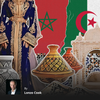Could nuclear energy one day power the Maghreb?
The Maghreb’s energy transition is a complex but critical journey towards sustainability and decarbonization as countries aim to meet

When a Moroccan chef calls couscous “as Moroccan as the Atlas Mountains,” an Algerian rival is quick to declare it a national treasure. These are not mere culinary spats. From kitchens to catwalks to tile workshops, Morocco and Algeria are locked in a subtle but revealing contest over their shared cultural inheritance. Recipes, garments, and designs have become proxies for a deeper rivalry across the Maghreb.
Food is the front line. In 2020, couscous was inscribed on UNESCO’s intangible heritage list, a joint North African bid — with Algeria joining somewhat reluctantly. The humble semolina dish has since sparked social media feuds, competing festivals, and nationalist boasts. Gastronomy has become a vehicle of soft power, projecting authenticity and a connection to the land, all packaged for global consumption.
Fashion is another battleground. The caftan — flowing, embroidered, and proudly displayed on runways from Casablanca to Paris — has been championed by Moroccan designers. Algerians, for their part, argue their karakou and burnous are no less emblematic of Maghrebi style. Beneath the brocade lies a commercial struggle for cultural branding, as each country hopes to monetize centuries-old craft and tap into the nostalgia of a well-heeled diaspora.
Even architecture is pressed into service. Morocco’s intricate zelige tiles find close cousins in Algerian geometric patterns, both heirs to the Islamic-Andalusian aesthetic. Restoration projects and heritage tourism feed the rivalry, as each nation spotlights its medinas — Fez for Morocco, Algiers for Algeria — as the true heart of Maghrebi civilization. Foreign visitors, lured by images of tiled courtyards and winding alleys, become unwitting players in this cultural competition.
Such rivalries may appear parochial, but they rest on decades of mutual suspicion. Morocco and Algeria remain adversaries, divided by the unresolved conflict in Western Sahara and competing foreign-policy ambitions. Cultural symbols have become safe outlets for nationalist sentiment, a way to claim the moral high ground without firing a shot.
There is, in truth, no monolithic Maghrebi culture — only parallel claims to a heritage that is as shared as it is disputed, adapted to suit local tastes and ambitions. A more cooperative spirit might turn that entanglement into an advantage, promoting the Maghreb as a collective cultural destination. But with mistrust still entrenched on both sides of the frontier, that prospect seems remote. For now, the embroidery, the recipes, and the tiles will remain spoils in a quiet yet enduring war of identity.
*Lonzo Cook is a journalist and writer. He spent two decades at CNN in a series of senior editorial and management roles including leading breaking news operations across Asia, the Middle East and Latin America. He currently works as a senior communications strategist, partnering with corporations and executives to develop integrated communication strategies to connect with audiences in our fast paced, ever changing engagement landscape.
Sign up for the weekly newsletter and get our latest stories delivered straight to your inbox.